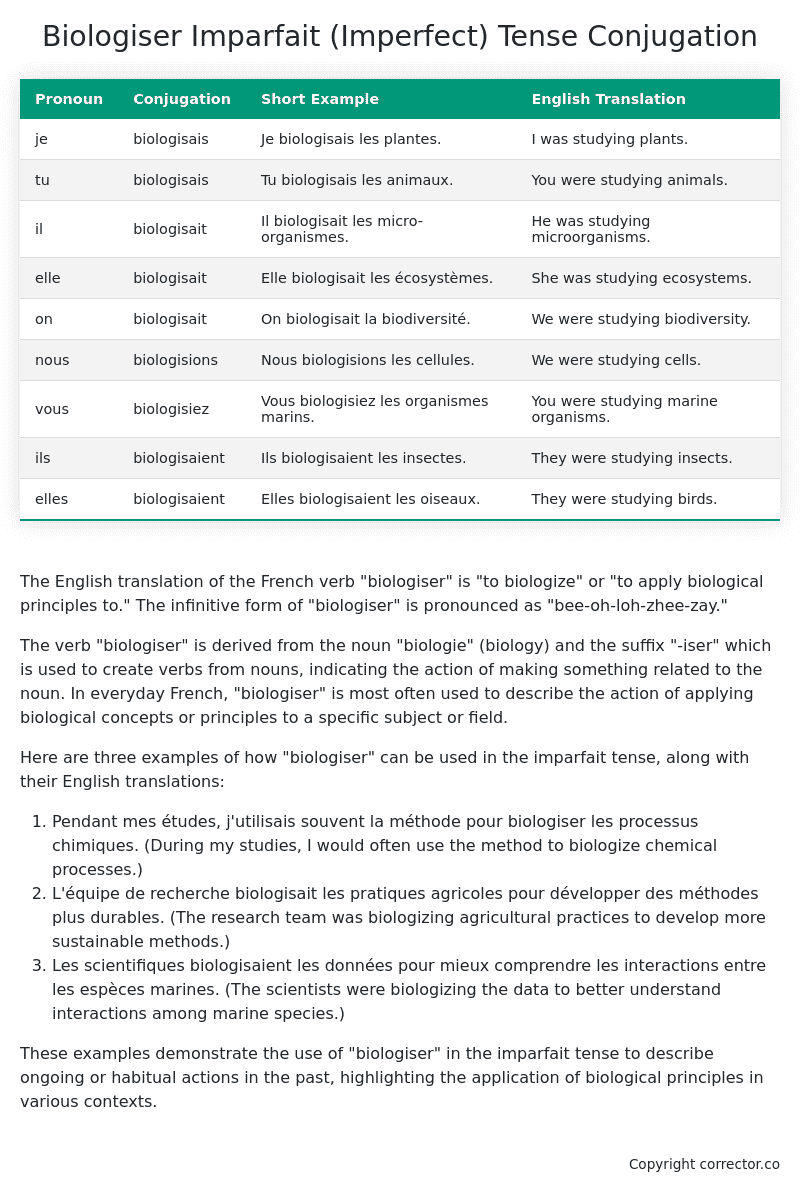Imparfait (Imperfect) Tense Conjugation of the French Verb biologiser
Introduction to the verb biologiser
The English translation of the French verb “biologiser” is “to biologize” or “to apply biological principles to.” The infinitive form of “biologiser” is pronounced as “bee-oh-loh-zhee-zay.”
The verb “biologiser” is derived from the noun “biologie” (biology) and the suffix “-iser” which is used to create verbs from nouns, indicating the action of making something related to the noun. In everyday French, “biologiser” is most often used to describe the action of applying biological concepts or principles to a specific subject or field.
Here are three examples of how “biologiser” can be used in the imparfait tense, along with their English translations:
- Pendant mes études, j’utilisais souvent la méthode pour biologiser les processus chimiques. (During my studies, I would often use the method to biologize chemical processes.)
- L’équipe de recherche biologisait les pratiques agricoles pour développer des méthodes plus durables. (The research team was biologizing agricultural practices to develop more sustainable methods.)
- Les scientifiques biologisaient les données pour mieux comprendre les interactions entre les espèces marines. (The scientists were biologizing the data to better understand interactions among marine species.)
These examples demonstrate the use of “biologiser” in the imparfait tense to describe ongoing or habitual actions in the past, highlighting the application of biological principles in various contexts.
Table of the Imparfait (Imperfect) Tense Conjugation of biologiser
| Pronoun | Conjugation | Short Example | English Translation |
|---|---|---|---|
| je | biologisais | Je biologisais les plantes. | I was studying plants. |
| tu | biologisais | Tu biologisais les animaux. | You were studying animals. |
| il | biologisait | Il biologisait les micro-organismes. | He was studying microorganisms. |
| elle | biologisait | Elle biologisait les écosystèmes. | She was studying ecosystems. |
| on | biologisait | On biologisait la biodiversité. | We were studying biodiversity. |
| nous | biologisions | Nous biologisions les cellules. | We were studying cells. |
| vous | biologisiez | Vous biologisiez les organismes marins. | You were studying marine organisms. |
| ils | biologisaient | Ils biologisaient les insectes. | They were studying insects. |
| elles | biologisaient | Elles biologisaient les oiseaux. | They were studying birds. |
Other Conjugations for Biologiser.
Le Present (Present Tense) Conjugation of the French Verb biologiser
Imparfait (Imperfect) Tense Conjugation of the French Verb biologiser (You’re reading it right now!)
Passé Simple (Simple Past) Tense Conjugation of the French Verb biologiser
Passé Composé (Present Perfect) Tense Conjugation of the French Verb biologiser
Futur Simple (Simple Future) Tense Conjugation of the French Verb biologiser
Futur Proche (Near Future) Tense Conjugation of the French Verb biologiser
Plus-que-parfait (Pluperfect) Tense Conjugation of the French Verb biologiser
Passé Antérieur (Past Anterior) Tense Conjugation of the French Verb biologiser
Futur Antérieur (Future Anterior) Tense Conjugation of the French Verb biologiser
Subjonctif Présent (Subjunctive Present) Tense Conjugation of the French Verb biologiser
Subjonctif Passé (Subjunctive Past) Tense Conjugation of the French Verb biologiser
Subjonctif Imparfait (Subjunctive Imperfect) Tense Conjugation of the French Verb biologiser
Subjonctif Plus-que-parfait (Subjunctive Pluperfect) Tense Conjugation of the French Verb biologiser
Conditionnel Présent (Conditional Present) Tense Conjugation of the French Verb biologiser
Conditionnel Passé (Conditional Past) Tense Conjugation of the French Verb biologiser
Conditionnel Passé II (Conditional Past II) Tense Conjugation of the French Verb biologiser
L’impératif Présent (Imperative Present) Tense Conjugation of the French Verb biologiser
L’impératif Passé (Imperative Past) Tense Conjugation of the French Verb biologiser
L’infinitif Présent (Infinitive Present) Tense Conjugation of the French Verb biologiser
L’infinitif Passé (Infinitive Past) Tense Conjugation of the French Verb biologiser
Le Participe Présent (Present Participle) Tense Conjugation of the French Verb biologiser
Le Participe Passé (Past Participle) Tense Conjugation of the French Verb biologiser
Struggling with French verbs or the language in general? Why not use our free French Grammar Checker – no registration required!
Get a FREE Download Study Sheet of this Conjugation 🔥
Simply right click the image below, click “save image” and get your free reference for the biologiser imparfait tense conjugation!

Biologiser – About the French Imparfait Tense
NOTE: To take a deep dive into all the French tenses then see our article on Mastering French Tense Conjugation.
Formation of the Imparfait Tense
For regular -er verbs:
For regular -ir verbs
For regular -re verbs
Common Everyday Usage Patterns
Description of Past Habits
Background Information
Mental and Emotional States
It’s employed to express emotions, thoughts, or physical sensations in the past. For example: “J’étais content quand il est arrivé.” (I was happy when he arrived.)
Ongoing Actions
Points to Note About the Imparfait Tense
Passé Composé vs. Imparfait
Conditional
Si Clauses
Narration
I hope you enjoyed this article on the verb biologiser. Still in a learning mood? Check out another TOTALLY random French verb imparfait conjugation!


